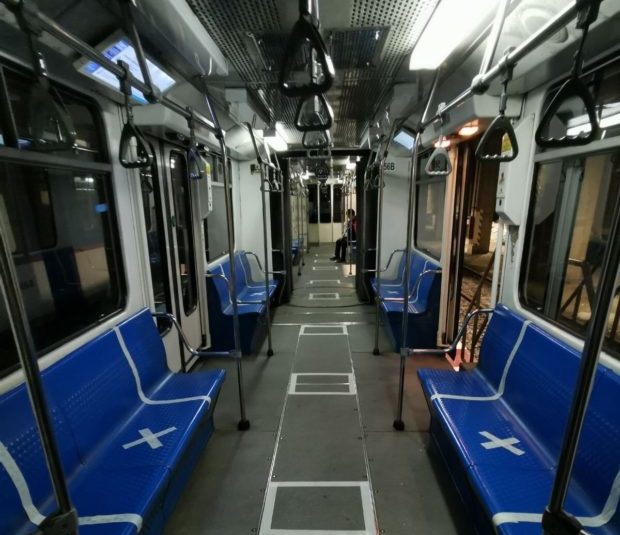LRT, MRT ban for elderly, moms-to-be under GCQ

KEEP YOUR DISTANCE, PLEASE The Department of Transportation is now drawing the line—literally—across the four major railways in the country in preparation for the resumption of operations with the lifting of the enhanced community quarantine. —Photo courtesy of DOTR
MANILA, Philippines — People considered highly vulnerable to the new coronavirus disease (COVID-19), particularly pregnant women or those below age 20 or 60 and above, will not be allowed to ride in Metro Manila’s four railway systems once these resume operations with the lifting of the enhanced community quarantine.
The new protocols are based on the guidelines set by the Interagency Task Force (IATF) for the Management of Emerging Infectious Diseases for areas under general community quarantine (GCQ).
These include requiring senior citizens to remain at home at all times, “except when indispensable under the circumstances for obtaining essential goods and services or for work in permitted industries and offices.”
The same goes for minors and pregnant women although the exceptions are applicable only to trains.
“Whatever the consideration of the IATF, that’s also what we are going to implement,” said Assistant Secretary Goddes Libiran.
Article continues after this advertisementLong wait
Passengers of the Light Rail Transit (LRT) Lines 1 and 2, Metro Rail Transit (MRT) 3 and Philippine National Railways (PNR) should also brace themselves for long lines and waiting time in between trains as the Department of Transportation (DOTr) will strictly enforce the physical distancing policy.
Article continues after this advertisementIn preparation for the reopening of the mass transport systems, lines measuring 1ʊ1 meter have been drawn on the seats and floors of LRT, MRT and PNR coaches as well as on platforms to ensure adequate spacing between passengers to prevent the spread of COVID-19.
The distancing protocol, while necessary, is expected to further limit the carrying capacity of the railway systems.
If the one-meter-apart rule is to be followed, each LRT 1 train can carry only 158 passengers (12 percent of its capacity) per trip; 160 (10 percent) for the LRT 2 and 153 (13 percent) for the MRT 3. All three normally carry over 1,000 passengers per trip.
A PNR train, on the other hand, will be limited to 148 passengers per trip, only 20 percent of its normal capacity.
Necessary protocol
But Transport Undersecretary for Railways TJ Batan said this was necessary to “reduce passenger concentration in trains, station platforms, concourses and elevators… We have to remember that this protocol aims to prevent the virus from spreading. We want to put an end to this health crisis, as we want to help our front-liners, our essential workers in going to their places of destination during the GCQ.”
The DOTr said it was preparing the deployment of more skip trains—or trains bypassing certain stations—to manage passenger volume, and a block system to control the entry of passengers into stations.
Face masks required
Following guidelines set by the Department of Health, the DOTr will ban passengers without face masks, those showing coronavirus symptoms or with registered body temperatures of 37.8 degrees Celsius or higher.
All station personnel will also be required to wear face masks and gloves, while security guards in charge of inspecting passengers’ bags or stationed at the Commuter Welfare Desk will have to wear face shields.
Regular disinfection and sanitation of train interiors, station premises and facilities will be conducted and hand washing or disinfectant stations will be set up.